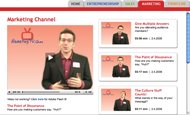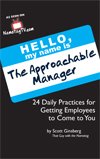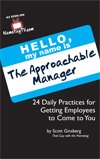 As an entrepreneur, my decision making-process is usually based on self-questioning.
As an entrepreneur, my decision making-process is usually based on self-questioning.
So, anytime I take on a new project, trudge forward with a risky endeavor or discover a new way to diversify my company, I start grilling myself.
What can I say? I’m obsessed with questions. (As if you didn’t already know that.)
I collect them.
I write about them.
I have a huge crush on them!
BUT MOST IMPORTANTLY: I leverage them to grow my business.
Today we’re going to explore a list called 22 Questions to Sidestep Entrepreneurial Atrophy. They’re divided into four main categories:
1. Financial
2. Growth
3. Asset
4. Competition
Let’s get started…
FINANCIAL QUESTIONS
1. How can I turn this into an income stream? Always think leverage. Always find a way to kill two stones with one bird. Find a way to make money everywhere. Just be sure you’re asking, “HOW,” and not “CAN I?” One is a possibility question; the other is a yes or no question.
2. Why am I NOT charging for this? Probably because you had to give it away for free in the beginning to build momentum, credibility and word of mouth. Which is perfectly acceptable. The challenge is making the transition, most of which derives from your sense of self-worth. You gotta believe in your product!
3. Should I be charging for this? Yes, if it has value, if you’re really good at it and if there’s a market for it.
4. How much could I be charging for this? Dude, I don’t know. Depends on what you’re worth per hour. Depends on how much work your new endeavor requires. Depends on how valuable your new “thing” is. Depends what the market will bear.
ASSET QUESTIONS
1. What personal skills have I not tapped into yet to build my business? Run an honest evaluation of what you bring to the table. Discover untapped assets and find a way to exploit them to grow your business.
2. What personal skills have I not tapped into yet to add value to my customers? Exact same process as question #1, except this time you’re exploiting them in the service of your customers.
3. What products and services are my clients asking for that I don’t currently provide? Notice the patterns. Keep a running list. Spot the trends in customer’s comments and figure out what that means for you.
4. Now that I have this, what else does this make possible? The ultimate leverage question. Future focused. Exciting. Also a possibility-question that doubles or triples the value of an asset when you think about its future value.
5. Are you cloning yourself through teaching others? Sheep? Bah! Clone yourself.
6. How can I give people a portable, junior, take-home, or alternate version of me? Can’t afford the speaking fee? Don’t want to PAY the speaking fee? Don’t have enough people to warrant an “audience” for a speech? No problem. Give clients different ways to “get” you. Different mediums. Different prices. Different YESES.
GROWTH QUESTIONS
1. What’s next? Most important question of all time. Keeps you moving. Sidesteps entrepreneurial atrophy. Future focused, growth-minded
2. What’s my sequel? You don’t want to be a one-hit wonder. You’re contributing to a life-long body of work. A library. A chronicle. Think Willie Nelson, not Don McLean.
3. What business COULD I be in? The logical next step. The obvious fit.
4. When was the last time you created new value? Hopefully, recently! Or are you just doing the same old stuff you did one year ago?
5. When was the last time you reinvented yourself? Every few years, at least. A good parallel is to look at the music industry. Explore the timeline of a musician who’s been around a LONG time and experienced multiple reinventions, still rocking all the while, i.e., Tom Waits or Van Morrison.
6. At what point are you making a living vs. building your business? This is when money takes a back seat to equity. When gross take a back seat to growth.
COMPETITION QUESTIONS
1. Will it make your company more competitive? If not, then what’s the point of taking this endeavor on?
2. What would most scare or piss off the competition? The answer to that question is what you should do. Something to make the competition think, “Damn, that IS pretty cool. I wish we’d thought of that first!”
3. If I do this, will I become the best? If not, bag it. Average is for losers. Especially in an age when the first hit on Google becomes the immediate front runner; it’s just not worth doing anything unless you’re going to become the best at it.
4. How can I change the rules so I can win at my own game? The best way to eliminate the competition is to NOT have any. To become the ONLY. That Guy. The sole source.
5. Where are the uncontested waters, and how can I swim there? Similarly, that means going where nobody else has the guts to go. That means becoming a category of one.
6. Is anybody else doing this now? If not, stuff it. If so, ask yourself if you can do it better and cooler. If you can’t, stuff it. If so, let’s go!
– – –
REMEMBER: Successful entrepreneurs are like sharks – if they don’t keep swimming, they die.
LET ME ASK YA THIS…
How are you sidestepping entrepreneurial atrophy?
LET ME SUGGEST THIS…
For the list called, “194 Books in Scott’s Success Library,” send an email to me, and I’ll send you the list for free!
* * * *
Scott Ginsberg
That Guy with the Nametag
[email protected]
 New website go live this week?
New website go live this week?
Tune in to The Entrepreneur Channel on NametagTV.com!
Watch video lessons on spreading the word!

 Hello! My name is Bob Johnson.
Hello! My name is Bob Johnson.  Starting your company? Naming your company? Renaming your company?
Starting your company? Naming your company? Renaming your company? 1. First, ante up.
1. First, ante up. Coaching, schmoaching.
Coaching, schmoaching. 1. MARK VICTOR HANSEN said, “Free enterprise means the more enterprising you are, the freer you are!”
1. MARK VICTOR HANSEN said, “Free enterprise means the more enterprising you are, the freer you are!”  Who’s telling their friends about YOU?
Who’s telling their friends about YOU? When people start talking ABOUT or get on the topic OF their passion, it’s interesting to note the changes in their communication patterns.
When people start talking ABOUT or get on the topic OF their passion, it’s interesting to note the changes in their communication patterns. What’s YOUR approach?
What’s YOUR approach? Growing bigger ears isn’t just about what you DO.
Growing bigger ears isn’t just about what you DO. If they can’t come UP to you; how will they ever get BEHIND you?
If they can’t come UP to you; how will they ever get BEHIND you? 1. Start off by giving yourself an idea quotient. The bigger the better.
1. Start off by giving yourself an idea quotient. The bigger the better. Enjoy this post?
Enjoy this post? We had a blast at the annual “Fire Sessions” @
We had a blast at the annual “Fire Sessions” @  If they can’t come UP to you; how will they ever get BEHIND you?
If they can’t come UP to you; how will they ever get BEHIND you? After speaking last week at the St. Louis Business Expo, a lot of people came up to me afterward with questions about blogging.
After speaking last week at the St. Louis Business Expo, a lot of people came up to me afterward with questions about blogging. Scared of the Bloggie Man?
Scared of the Bloggie Man? 1. A successful speech is a group effort.
1. A successful speech is a group effort. Are your customers proud to be your customers?
Are your customers proud to be your customers?